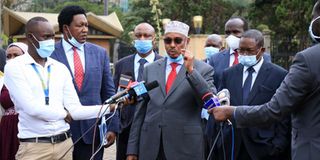Senators want new revenue sharing formula suspended for more talks

What you need to know:
- Speaker Kenneth Lusaka had, at the request of majority leader Samuel Poghisio, called the sitting for debate on the formula in order to eventually unlock county funds.
- When the House re-convened, minority leader James Orengo (Siaya) proposed another adjournment to allow more consultations on the report and a review of amendments proposed by senators.
- Elgeyo Marakwet Senator Kipchumba Murkomen, while supporting the adjournment, insisted that the current formula be used to share out the funds this financial year to give senators time to conclusively debate the third basis.
A special sitting of the Senate adjourned Monday without debating the third basis revenue sharing formula, throwing counties deeper into a financial crisis.
Speaker Kenneth Lusaka had, at the request of majority leader Samuel Poghisio, called the sitting for debate on the formula in order to eventually unlock county funds.
When the House convened in the afternoon, the Finance committee tabled its report on consideration of the formula as submitted to the Senate by the Commission on Revenue Allocation (CRA) and Deputy Speaker Margaret Kamar adjourned the session for 30 minutes for members to read the report.
When the House re-convened, however, minority leader James Orengo (Siaya) proposed another adjournment to allow more consultations on the report and a review of amendments proposed by senators.
“The proposed amendments are not simple. We need to study thoroughly to understand them,” Mr Orengo told the House.
CURRENT FORMULA
Three senators had by Monday submitted amendments to the formula developed by the committee, whose report includes improvements to the formula developed by the CRA.
Senators Ledama ole Kina (Narok), Abdullahi Ali (Wajir) and Mwangi Githiomi (Nyandarua) had filed their amendments, forcing Mr Orengo to insist that the House must understand them before debate. The amendments were not made public.
Elgeyo Marakwet Senator Kipchumba Murkomen, while supporting the adjournment, insisted that the current formula be used to share out the funds this financial year to give senators time to conclusively debate the third basis.
“The formula suggested by the committee is divisive because some counties are going to lose colossal amounts of money,” he said.
“Let’s pass the County Allocation of Revenue Bill, 2020 and share out the money using the existing formula then take one year to deliberate the new formula to make everyone happy.”
RECOMMENDATIONS
While the CRA capped expenditure on health index at 17 per cent, the committee improved it to 20 per cent, arguing it will be determined by three measures.
These are the facility gap at 20 per cent, the three year average of the number of primary health care visits to levels 2 and 3 facilities at 60 per cent, and a three year average in patient numbers in these hospitals at 20 per cent.
While the CRA gave agriculture 10 per as the weight for agriculture, the committee chaired by Kirinyaga Senator Charles Kibiru, recommended that the sector’s expenditure be determined through the county’s proportion of rural households as provided for in the 2019 population census.
The authority proposed 20 per cent as the weight for the basic share for counties but the committee proposes that 19 per cent be shared equally and one per cent based on the inverse of a county’s population.
If adopted, the committee’s report will also mean that the land parameter will be measured using a county’s proportion.
“The CRA recommended that though the parameter is assigned a weight of eight per cent, the allocation should be capped at seven per cent and the rest be redistributed,” the committee states in the report.
MARGINALISATION
The committee further says the roads access index should be determined by a county’s rural access index, which is the proportion of a population with access to a motorable road within two kilometers based on data at the Kenya Roads Board.
“This formula is divisive because it is marginalising the already marginalised,” Mr Murkomen said while supporting the proposal for more consultations.
Tharaka Nithi Senator Kithure Kindiki supported the push for more consultation, warning that the effects of entrenched marginalisation in the new formula will be felt even after 100 years.




